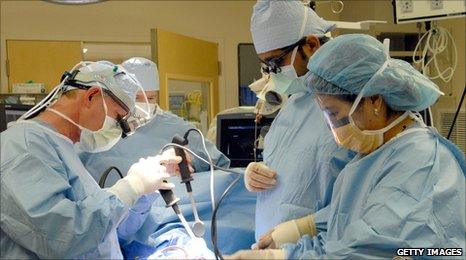The man with a plastic heart
- Published

The demand for heart transplants cannot keep pace with demand
Heart disease threatens the lives of millions, but with only limited hearts available for transplant, medical science has long yearned for a definitive fix to repair or replace this most vital organ.
Troy Golden, a pastor from Oklahoma, was born with a heart that would one day break. A genetic condition known as Marfan's syndrome has been slowly attacking his body tissue since birth including around his heart and valves.
At the age of 41, he had to undergo life-saving surgery, replacing valves and reshaping his heart's walls. But his condition continued to worsen. In January 2010, he was put on the heart transplant list, but time ran out without a donor.
"Troy's heart was so bad that a traditional heart pump wouldn't be enough," explains Troy's cardiologist Dr Doug Horstmanshof. "So, we decided to try something different - completely replacing the heart."
In September last year, Troy became one of the few people in the US to have his entire heart replaced with a device called the Total Artificial Heart. It's made of plastic and weighs 160 grams and is a little larger than a biological heart. It is powered by a pneumatic pump that you carry around in a rucksack.
Awe inspiring moment
Dr James Long, Troy's surgeon, recalled the moment the heart was implanted into Troy. "It was admittedly rather awe-inspiring," he says. And it was ominous to look inside the chest and know that the only thing keeping him alive was the synthetic pump that we had just replaced his heart with."
Troy has had to get used to the non-stop sound of the pneumatic pump. But he looks and feels remarkably well and is overwhelmed by what has been done for him.
"It's awesome," he said "to be out of the hospital and to be able to come back home and to be able to come back to some normal life."
"You can't even just really comprehend taking your heart out, you know, without a heart you're not alive."
The Total Artificial Heart has done more than buy Troy some time. It has given him his life back and it has given him hope. But this is not a permanent solution. His heart's batteries must be constantly charged, spares must stand at the ready. The risk of infection and clotting add to the constant worry.
Medical challenge
For now Troy must again endure the long wait for a donor heart, but there are other solutions on the horizon. New avenues of research are focussing on efforts to assist, rather than replace the heart.
Increasingly, in patients suffering from heart failure, miniaturised pumps are being used to assist heart function. They are about the size of a cigar and are essentially plugged into the main pumping chamber of the heart to help it along.
Unlike Troy's artificial heart, they can be left in place indefinitely. But perhaps more remarkable is the fact that these pumps can sometime be removed, once a damaged heart has recovered.
And it is the potential for hearts to actually recover, after having been damaged, that is being investigated in some of the most exciting research going on today.
Much interest centres on stem cells because they are the closest natural thing to the body' s spare parts and, under the right conditions, they have the potential to transform into a huge number of different cell types with specialised functions. Because of this, they can take part in the process of renewal - replacing diseased and damaged tissues.
Preliminary results are highly controversial, but there is a growing body of evidence that suggests we may in the future be able to harness the heart's potential regenerative capacity for future therapies.
Growing new hearts
More radically, Dr Doris Taylor, of the University of Minnesota, has been using stem cells to actually build new hearts in the laboratory.
She has achieved this with a rat heart by stripping it of its cells, then re-populating the resulting perfectly heart-shaped scaffold with stem cells, which adapt into heart tissue, so that in time the heart begins to beat again.
".. the thought would be that we would take a heart, probably from a pig .. wash all the cells out, and then take your cells and grow enough of them to .. build a heart that matches your body and have it transplanted into you. That's the home run," says Dr Taylor.
If the clinical application can be made to work, it is a revolutionary if relatively distant possibility.
For Troy and the millions of people like him for whom heart failure is a reality, this work is of vital importance.
There is the very real possibility here that, within our lifetimes, scientists might finally find the cure they're looking for.
While their search for that magic bullet remedy is far from at an end, each new discovery brings them another step closer.
Horizon: How to Mend a Broken Heart will be on BBC Two at 9pm on Monday 14 February 2011 and after on BBC iPlayer
- Published27 September 2010